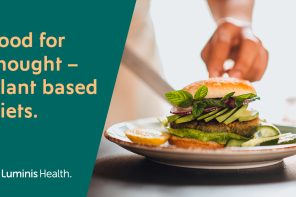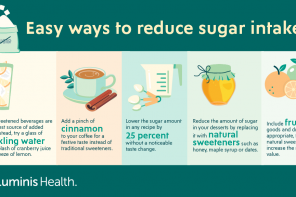Food recommendations to eat more fiber, fruits and vegetables haven’t changed. These guidelines are not lost on the food industry either. In efforts to sell their products they use buzzwords on labels such as “equals one serving of vegetables,” or “a good source of fiber” to sell veggie chips, chewy bars and even cookies. It appears to have become about marketing, not healthy eating. This is not the only place in the grocery store that takes the opportunity to try and shape your choices and tell you what you should be eating. Let’s answer a few questions to set the record straight.
- Are brownies rich in fiber a good choice to increase our fiber? No, the fiber in these products is a white powder called inulin, polydextrose and modified starches. This processed fiber does not provide the bulk or fullness feeling as advertised to promote weight loss. The best sources of fiber are fresh fruits, vegetables and high fiber grains with more than three grams per serving.
- Is gluten bad for everyone? If you have celiac disease, then you shouldn’t eat gluten. There is also a group of people that have gluten intolerance, which does not cause the autoimmune response that individuals with celiac disease experience, yet improves digestion. Gluten intolerance research is ongoing since there aren’t diagnostic criteria to diagnose. Some people believe gluten-free eating is healthier — this is false. It is usually void of fiber; is higher in either fat or sugar, or both; and has more calories.
- Is organic healthier? There is not enough evidence to show that organic food is always healthier than conventionally grown food. While there are some differences in the nutrient contents, the flexible nature of food production and handling makes it difficult to generalize results. The term organic refers to foods that meet a set of standards that restrict the use of certain pesticides and fertilizers in farming. They are usually not processed using irradiation, industrial solvents or synthetic food additives.
- Does everyone need probiotics to be healthy? Not necessarily. Probiotics are a type of good bacteria. These microorganisms can help with digestion and offer protection from harmful bacteria, just as the existing good bacteria already do. You can find probiotics in foods like yogurts, sauerkraut and kimchi. Although more research is needed, there is evidence that probiotics might help treat diarrhea, especially after antibiotic use; irritable bowel syndrome; and ease allergic disorders, such as eczema and hay fever. If you take a supplement, make sure to check with your doctor first.
- Do detox teas and drinks clean our system? Our digestion system includes the liver and kidneys, which naturally cleanse our bodies of harmful substances. Usually, detox products are weight loss gimmicks designed to give people short-term gratification, with no regard for their long-term health, physique or lifestyle habits. If you want to lose weight, eat less and exercise more!
The size of our grocery stores with 24 lanes is a good example of the difference of foods available today, compared with years ago when we had six lanes. The foods we look for to provide vital nutrients do not come in packages, bags or processed foods — they grow naturally and are found on the perimeter of the store.
 Ann Caldwell and Maureen Shackelford are nutritionists and registered dietitians at Anne Arundel Medical Center. To reach them, call 443-481-5555.
Ann Caldwell and Maureen Shackelford are nutritionists and registered dietitians at Anne Arundel Medical Center. To reach them, call 443-481-5555.




